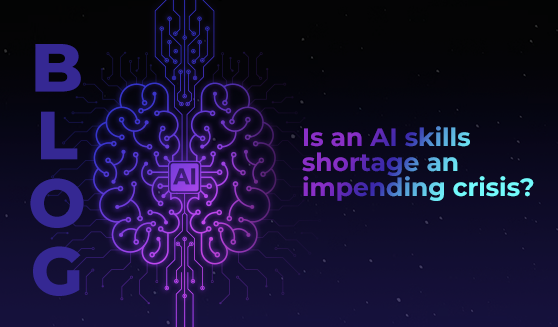
Top trends to watch in the smart cities market
Explore key smart city market trends for 2025–2030, from EV infrastructure to AI-powered waste systems – backed by the latest industry report.


When James Caan CBE (Serial entrepreneur, Media Commentator and Former Investor on BBC’s Dragons’ Den) joined us on the LEAP:IN podcast, he talked about the UK’s relationship with AI – and specifically, AI skills.
Caan noted that as AI tech has filtered into cultural awareness over the last five years or so, it’s been difficult to get company directors to focus on learning AI skills, or to understand the potential impact on AI on their businesses (and on wider society).
So while other countries around the world have stepped into the explosion of AI with relative confidence – and with enough capable hands to start deploying new tools quickly – the UK lags behind.
This isn’t just Caan’s opinion. New research, conducted by the Digital Futures at Work Research Centre (Digit) at the University of Leeds, shows that the majority of UK firms are falling behind in AI adoption – and this is causing a widening digital divide.
Only 36% of the companies surveyed between November 2021 and June 2022 had invested in AI and ML tech in the preceding five years.
According to the IBM Global AI Adoption Index in 2022, 38% of UK respondents said a skills gap was the key inhibitor to AI adoption – compared with 28% across Europe, and just 24% in the UK’s neighbour, France.
And in only a year, the UK has dropped 26 places to 64th out of 100 countries in Coursera’s annual report that assesses approaches to skills development. The genie is out of the bottle – we know AI is here to stay, and we know it’s going to play a major role in how businesses function in the future. And yet the resistance to upskilling is still strong in some pockets of the global economy – and those pockets are going to find themselves neglected by international, tech-positive markets.
As Caan explained, this lack of investment indicates that problems will soon become more apparent.
“The problem is that we have this huge lack of skills,” he said, “of people to be able to develop AI itself. I think the technology absolutely exists, but in order to execute and implement the technology and bring it into the workplace, there is a massive shortage of talent.”
There’s a lack of education and awareness about the realities of the future job market – with companies continuing to bury their heads in the sand and stick with conventional working practices, while global competitors embrace new technologies and get ahead.
“I just don’t believe that we are educating our workforce to embrace the changing digital transformation that is taking place,” Caan added.
The Digit study showed that the skills shortage is already becoming a real problem – with 75% of employees reporting difficulties in recruiting team members with necessary digital skills. And yet even though they’re already struggling with this, less than 10% of employers have plans to make significant investments in digital skills training in the coming years. A worrying 60% of employers said that none of their employees had received any formal digital skills training within the last year.
“I think it makes the UK uncompetitive,” Caan said. “Because as you know, certain technologies have transformed the way we work, transformed the way our economy operates, transformed the purchasing power of countries. Technology is here to stay. It is the heartbeat of the economy. And if you’re a country that is not positioned to take full advantage, you are in an uncompetitive situation.”
According to live data from the OECD, the top concentrations of AI talent are in India, Germany, and Sweden. And some countries in the Middle East, including the UAE and Saudi Arabia, have laid out ambitious strategies to invest in AI skills development and position themselves as leaders in digitisation.
If the UK doesn’t work to change its approach to AI and digital skills, it won’t have the workforce required to integrate new technologies into operations and products. An AI skills shortage will set a nation at a disadvantage. So all countries, organisations, and companies should be paying attention to where their AI limitations lie right now.

Explore key smart city market trends for 2025–2030, from EV infrastructure to AI-powered waste systems – backed by the latest industry report.

Learn how generative AI is unlocking the true potential of digital twins – to make smart cities more efficient, inclusive, and citizen-focused.

The smart cities of the future will use tech to lower emissions, cut urban temperatures, and improve quality of life in highly populated areas.

Explore key smart city market trends for 2025–2030, from EV infrastructure to AI-powered waste systems – backed by the latest industry report.

Learn how generative AI is unlocking the true potential of digital twins – to make smart cities more efficient, inclusive, and citizen-focused.

The smart cities of the future will use tech to lower emissions, cut urban temperatures, and improve quality of life in highly populated areas.